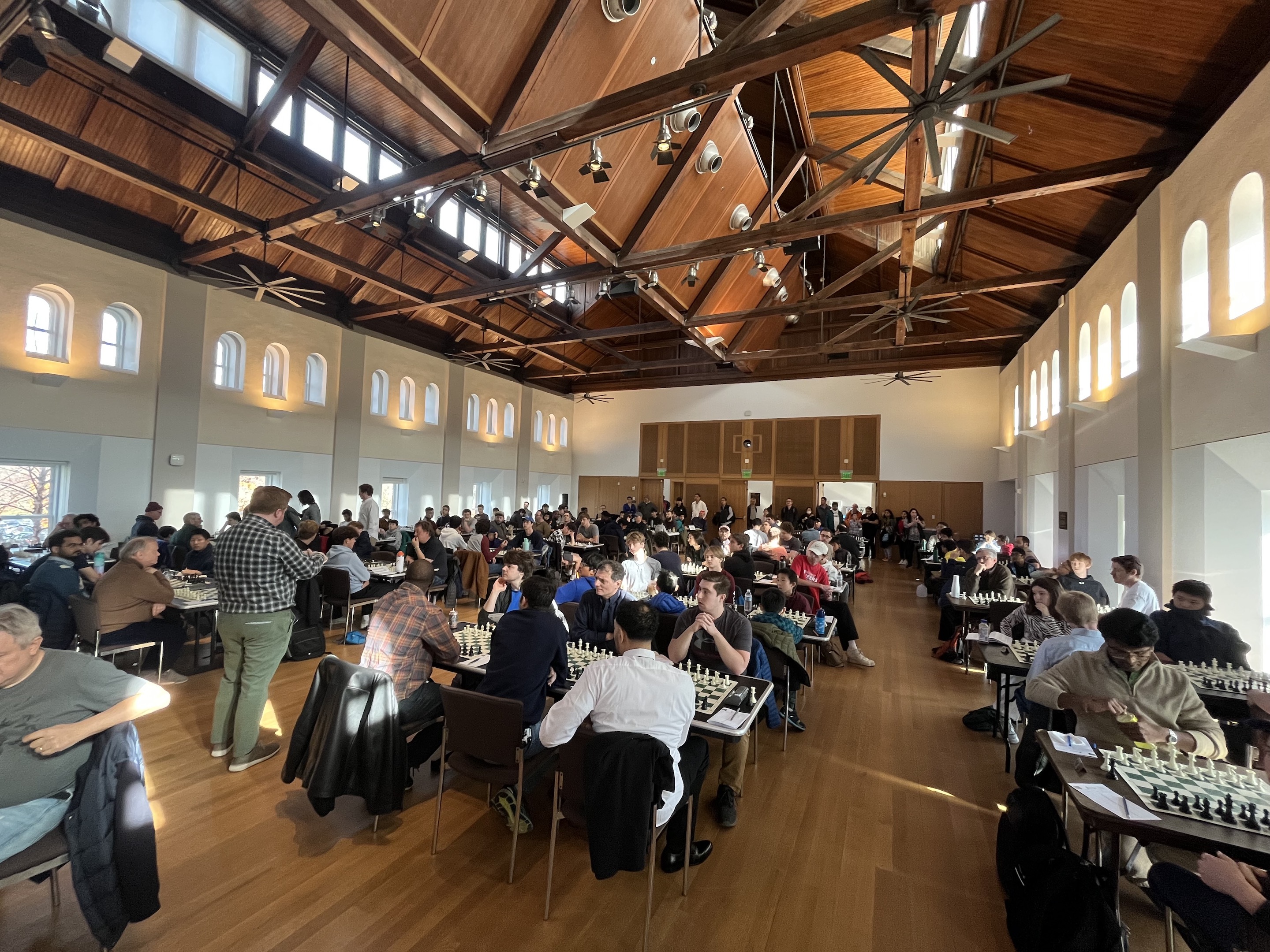
c/o Collin Holson
The University hosted the Connecticut State Chess Championship in Beckham Hall on Sunday, Nov. 12. It was the largest tournament in Connecticut history, featuring 220 players from 11 different states. Ten Wesleyan students (Kai Paik ’27, Jeremiah McFarland ’24, Vibhuv Reddy ’24, Collin Holson ’25, Osondu Ugochukwu ’26, Yinka Vaughan ’27, Andrew Chung ’27, Asher Moss ’25, Trevor Brooks ’27, and Amit Piryatinsky ’27) participated in the tournament.
The players were sorted into a total of six sections, each catering to a different skill level. At the top was the competitive open section, boasting three grandmasters and drawing in a total of 15 title players. On the other end was the unrated section with approximately 20 participants, which welcomed everyone, even those without a United States Chess Federation (USCF) membership. The bulk of the participants fell within the middle sections, which divided players according to scores. The under 800 (U800), under 1200 (U1200), and under 1700 (U1700) sections were the largest, each attracting roughly 50 eager players.
The Wesleyan Chess Club (WesChess) partnered with the Connecticut Chess Association (CCA) to run the tournament. The CCA offered comprehensive logistical assistance, deploying two experienced tournament directors—Franco Ibanez and Ian Harris—who were responsible for structuring the pairings and managing scorekeeping. The CCA also provided Digital Game Technology (DGT) boards which, when hooked up to a computer, can project ongoing games for the entire room to see. The club also received logistical support from the Office of Student Involvement (OSI).
“In particular, [Associate Director of Student Involvement Jennifer Cheng] was fantastic,” Co-President of WesChess Holson—who competed in the U1700 section and finished 11th overall—said. “We had almost twice as many players as we expected show up to the event. We were aiming for about 100 people and instead we had 220. So, obviously, that took a lot of last-minute changes, a lot of flying-by-the-seat-of-your-pants, and Jen Cheng and the CCA were incredible.”
The first game commenced at 10:30 a.m. and the matches continued until 7:30 p.m. Due to the WesChess’s involvement in organizing the tournament, many players extended their presence by assisting with setting up before and cleaning up afterward, leading to nearly a 12-hour day for some of the participants.
Each player competed in four games throughout the day. The format of the games were G/55;d5, meaning both players had 55 minutes between turns for each game, with a five second delay before their timer started. Scoring was allocated as one point for a win, half a point for a draw, and no points for a loss.
Two of the highest-rated players, Oliver Chernin, a national master from New York, and Maxim Dlugy, the eventual champion and a grandmaster from Pennsylvania, faced off in the tournament’s opening match. Although Chernin was assigned to play as white and make the opening move, President Michael Roth ’78 initiated the game.
“To celebrate the special occasion, the largest tournament in Connecticut history, we’re like, ‘Let’s get something to jazz this event up,’” Holson said. “So we invited Michael Roth to make the ceremonial first move. He was there at 10:30; he’s much taller than you’d expect. So we had him come out. He got in front of the first board where the highest rated players were playing, and he made the first move. We did a little photo op, and we thanked the University for allowing us to host this event.”
WesChess impressed, with its members cumulatively securing 16.5 out of 27 possible points. Paik emerged as a standout, clinching the second position overall in the U1200 section, which boasted 41 participants. Paik started with a bye, which occurs when there is an uneven number of players at a tournament, necessitating that one player remain unmatched for the first round. This automatically earned him half a point and he won his subsequent three matches, culminating in a final score of 3.5/4. Despite entering the tournament without a rating, Paik’s remarkable display on the board propelled him to a rating of 1483.
Wesleyan had two players play in the open sections, which consisted of 11 natural masters and three grand masters. Reddy and Brooks finished 12th and 15th, respectively. Reddy, playing black, won his first game against natural master Richard Bauer.
“Shout out to both Vibhuv [Reddy] and Trevor Brooks, who’s a freshman right now,” Holson said. “They could have both entered into a lower rated section but chose not to and instead competed against the strongest competition, and Vibhuv beating a natural master is insane.”
The tournament showcased a diverse range of participants in terms of age. Sergey Kudrin, a 64-year-old Russian-American grandmaster who previously claimed the third spot in the United States Chess Championship of 2008, replicated this achievement in this tournament, securing the same rank with an overall score of 2.5/4 points. On the opposite end of the age spectrum was the exceptional talent of Corin Gartenlaub, a 10-year-old prodigy. Gartenlaub displayed consistency by securing at least a draw in each of his matches, notably achieving victory over natural master Gary Shure while playing black. His performance concluded in a final score of 2.5/4 points, securing the ninth position overall.
“This was our best attended tournament in a long time,” Holson said. “This has been really cool because when I got here, this wasn’t even an incorporated club. We were a student association and Vibhuv [Reddy] and Ben Sheriff [’25] put in a ton of work to get the club to where it is now.”
Although the tournament is over, students interested in playing chess can attend WesChess’s biweekly meetings. Wednesday meetings are dedicated to more relaxed and informal sessions, providing an open space for members to engage in casual gameplay and enjoy friendly matches. Saturdays are reserved for more competitive sessions, featuring blitz chess games and focused practice on particular tactics and strategies. WesChess encourages new members to attend a Wednesday meeting.
Sam Weitzman-Kurker can be reached at sweitzmankur@wesleyan.edu.